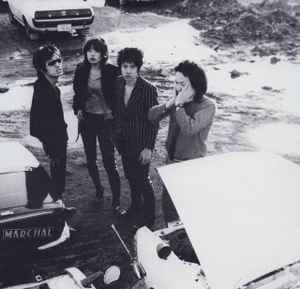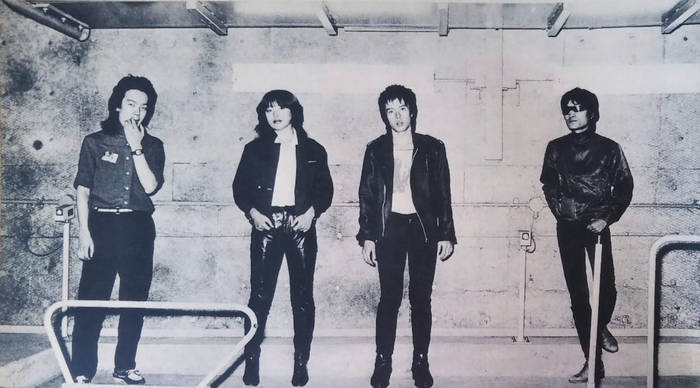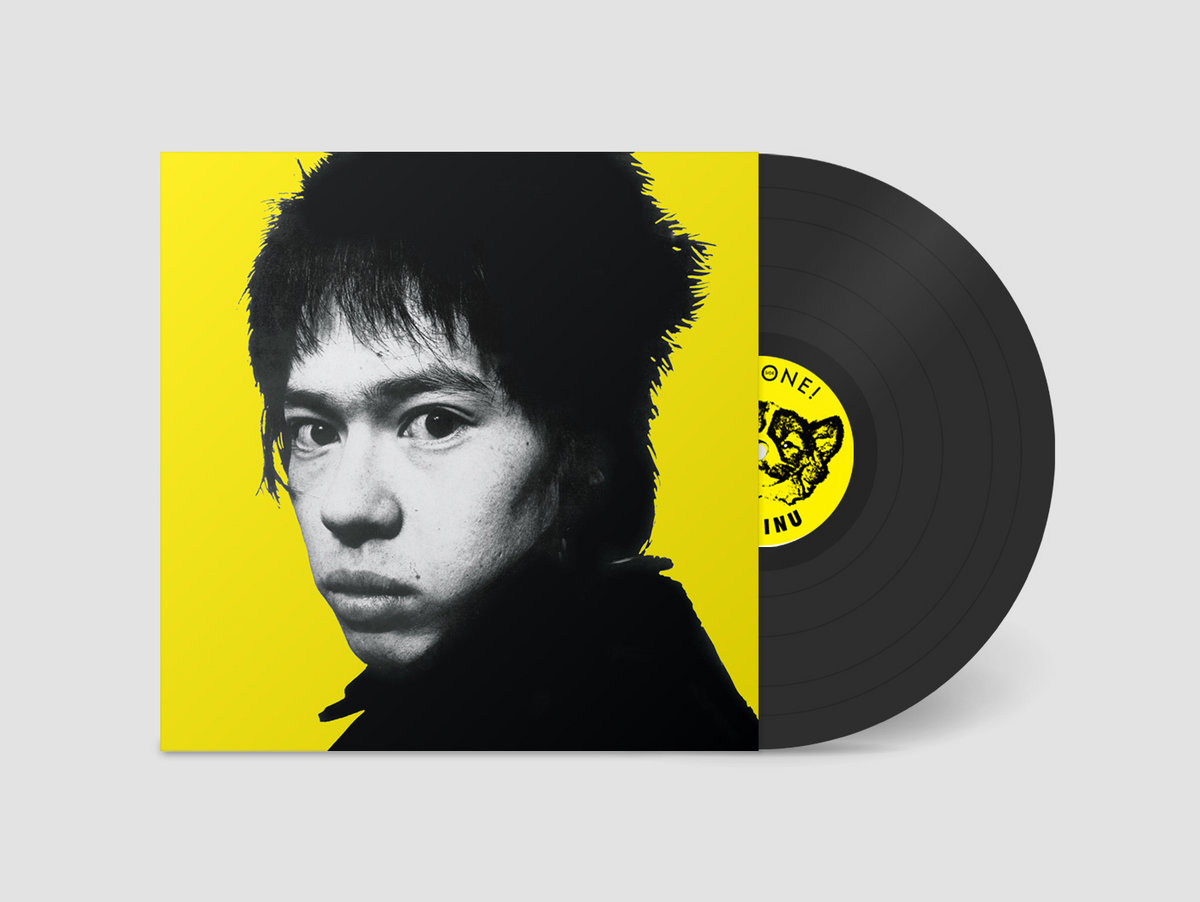Don't Eat Food!
Mesh-Key records and Cohearent Audio bring us one of Japan's seminal punk classics
By the time the 1980s rolled around in Japan, rock music had gone through numerous cycles of boom and bust, starting with Beatles-inspired pop in the 1960s (aka “Group Sounds”), to Hendrix-tinged blues covers, to the Japanese language folk rock movement active in the mid 70s. The youth of Japan, now beginning to feel the downstream effects of the postwar economic miracle were clamoring for a new creative artistic movement to supplant the faded glory of globalized hippie culture. Like most other countries in the free world, they found that outlet through punk rock, and later new wave.
 If you want to know more about the shifting tides of the Japanese taste for rock music, I recommend checking out Julian Cope’s excellent 2009 book Japrocksampler: How the Post-War Japanese Blew Their Minds on Rock 'n' Roll (just a note to American readers that the abbreviation “Jap” is considered a pejorative in the United States, but not in Japan or Europe where the author is from). By the end of the 70s, musicians in Japan were already aware of the rising rebellion and popularity of the punk rock movement, but that didn’t necessarily translate to a burgeoning scene at home. Many bands in both the trendy Tokyo music scene, and also the smaller Kansai region scene (encompassing Osaka, Kyoto, and Kobe), adopted the aesthetics of punk rock without replacing the more cookie-cutter rock and roll music that had become standard fare at this point.
If you want to know more about the shifting tides of the Japanese taste for rock music, I recommend checking out Julian Cope’s excellent 2009 book Japrocksampler: How the Post-War Japanese Blew Their Minds on Rock 'n' Roll (just a note to American readers that the abbreviation “Jap” is considered a pejorative in the United States, but not in Japan or Europe where the author is from). By the end of the 70s, musicians in Japan were already aware of the rising rebellion and popularity of the punk rock movement, but that didn’t necessarily translate to a burgeoning scene at home. Many bands in both the trendy Tokyo music scene, and also the smaller Kansai region scene (encompassing Osaka, Kyoto, and Kobe), adopted the aesthetics of punk rock without replacing the more cookie-cutter rock and roll music that had become standard fare at this point.
Inu (the Japanese word for “Dog”) was formed in Osaka in 1979 by a teenage Kou Machida, a punk rock poet with a thick Kansai accent (known today primarily as an award-winning author). Well-known Japanese avantgarde musician Naoto Hayashi was also a member of the band in their early days, which included a series of infamous shows in Tokyo alongside other Osaka-based bands that rattled the trendy yet complacent punk rockers there. Inu brought an authenticity, energy, and outsider fire to their live performances, which often included frontman Machida acting as an Iggy Pop-style provocateur, antagonizing and picking fights with the crowd.
After a series of lineup changes and an evolved sound which took the ferocious energy of their early punk days and applied it to more pop and new wave song structures, Inu released Meshikuuna! (literally “Don’t Eat Food!”) in in March of 1981, their major label debut and only full-length release. Their time in the sun was short-lived, with the group disbanding later that summer. However, since that time, Don’t Eat Food! achieved cult status in the Japanese music scene, often considered the most important post-punk record to come from the island nation.
 Don’t Eat Food! is a delight for fans of early 80s art-punk. It perfectly balances the group’s ability to pen short, concise punk tunes, and their penchant for more experimental noise and chaos. The album starts with upbeat anthems such as “Fade Out” and “Lift the Lid”, and if you were to listen to the first three tracks of this album alone, you might mistake Inu for an off-kilter Japanese version of Generation X. However, by track A4 “Dumdum Bullet”, we start to see hints of Inu’s art school credentials, as Naruko Nishikawa’s bass lines become deeper and more menacing, and Masahiro Kitada treats his guitar more like an instrument of percussive affect than harmony or melody. “Into Dreams” is where we really fall into the rabbit hole, with vocalist Ko Machida channeling a heroin-dazed Lou Reed over a dreamlike texture of reverse-delay guitars. The title track finishes side A, and it oozes sludge and weight with a sound totally ahead of its time (it would be another few years until we would come to refer to this type of hardcore punk riff structure as a “breakdown”).
Don’t Eat Food! is a delight for fans of early 80s art-punk. It perfectly balances the group’s ability to pen short, concise punk tunes, and their penchant for more experimental noise and chaos. The album starts with upbeat anthems such as “Fade Out” and “Lift the Lid”, and if you were to listen to the first three tracks of this album alone, you might mistake Inu for an off-kilter Japanese version of Generation X. However, by track A4 “Dumdum Bullet”, we start to see hints of Inu’s art school credentials, as Naruko Nishikawa’s bass lines become deeper and more menacing, and Masahiro Kitada treats his guitar more like an instrument of percussive affect than harmony or melody. “Into Dreams” is where we really fall into the rabbit hole, with vocalist Ko Machida channeling a heroin-dazed Lou Reed over a dreamlike texture of reverse-delay guitars. The title track finishes side A, and it oozes sludge and weight with a sound totally ahead of its time (it would be another few years until we would come to refer to this type of hardcore punk riff structure as a “breakdown”).
Side two continues the descent into madness, however now there is a haunting melodic sophistication to the band’s sound. “Inrotakin” is a demented upbeat pop palate cleanser, while “305”, my personal favorite cut on the album, showcases a sophisticated set of melodic twists and turns over a driving, danceable drum beat, almost as if The Police penned a simmering goth track. With sonic variety and relentless pacing, Don’t Eat Food! showcases a creative maturity that belies the age of the young musicians who created it.
I first discovered this album three years ago in my search to connect the dots of the early 80s Japanese rock music landscape. It captivated me with its originality and sophistication, and I immediately ordered an original 1981 Japan Record pressing (Jal-4) on discogs. Never in a million years did I think this album would receive a reissue, particularly one by a western label, but that is where Mesh-Key records continues to surprise me.
Mesh-Key, a small independent reissue label out of New York City, first came on my radar when I heard they were putting out a reissue of the 1968 cult-classic Japanese Psych album Vacant World. That release, mastered by Kevin Gray and housed in a thick tip-on Jacket, blew away my expectations of indie reissue labels. They took a decent sounding Psych gem, and turned it into a true audiophile experience, unleashing the brilliant recording hidden by years of subpar pressings. Even though it was cut from a high-resolution digital transfer rather than analog tapes themselves, it impressed me both sonically and as an archival product - a J-rock “Tone Poet” if you will.
Label owner Justin Simon has a special interest in underground music in Japan, having lived as a musician there for 6 years in the late 1990s. He started Mesh-Key to release music he recorded during his time there, later branching out to releases featuring his friends’ bands, and eventually using it as a vehicle to revive the hidden gems of the Japanese underground. Inu were one of those bands Justin discovered during his first stint on the other side of the pacific. In 2006 he met singer Kou Machida and expressed interest in reissuing his album, but it wasn’t until 2017 when he began communicating with Tokuma records (formerly Japan Records) in earnest, hoping to give this album a proper worldwide vinyl release. Six years and many emails later, here we are.
Now, this release advertises itself online as “mastered by Kevin Gray”, however, unlike the Jacks reissue that did receive that treatment, the deadwax of this reissue reads MCL@CA, which of course stands for Matthew Lutthans, Kevin Gray’s “protégé” at Cohearent Audio (and also the lead engineer at The Mastering Lab in Salina, KS). No need to fret however, as Lutthans has proven his chops on many excellent Cohearent Audio releases. The source material for this cutting was a high-resolution digital file, which for an indie label trying to license an album from halfway around the world, is certainly one of the best-case scenarios one can hope for.
Comparing this reissue to my original Japan Records cut, I was strapped in for another sonic tour deforce like Vacant World from last year, however this is definitely not as natural and spacious a recording as that one from 1968. Don’t Eat Food! is a pumped-up Punk/New Wave record with a production quality typical for a band of that era and size. The original pressing is cut loud, with instruments pushed to the forefront, the benefit of this is that all the instruments really “snap” with very sharp and satisfying transient attacks. Occasionally things sound a little “pressed”, but that forward sound also gives it energy.
The Mesh-Key reissue on the other hand is a more round and warm cut. This gives you the ability to really crank it without fearing for the high end transients, but it also reduces a little of that punch that makes the original pressing such a (slam-)danceable record. For my money, I prefer the original pressing, and of course it’s not a fair fight. The original pressing used the original tapes when they were fresh off the cutting room floor, while this reissue has the handicap of both time and digitization. Still, I think Matthew Lutthans and Mesh-Key have captured the essence and soul of this post-punk gem.
If you already own an (increasingly expensive) original pressing of this great record, I wouldn’t say you need to go out and pick this up. But to the 99.9% of Tracking Angle readers that don’t own an original, I can highly recommend this pressing at the very reasonable price of $29.99. It may not have the Staughton-style tip-on jacket that their last release sported, but it comes with an excellent English-language essay and photo book which provides important background and history of the group. It's also pressed on reasonably quiet vinyl at Precision in Canada. If you need a break from your monthly order of Blue Notes and Atlantic 75 reissues, take a walk down the wild streets of 1980s Osaka and give Don’t Eat Food! a spin.










































.png)








